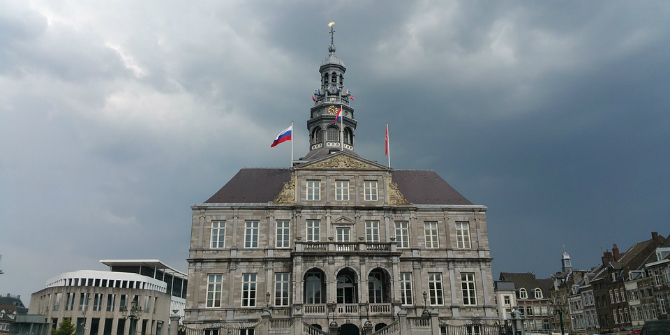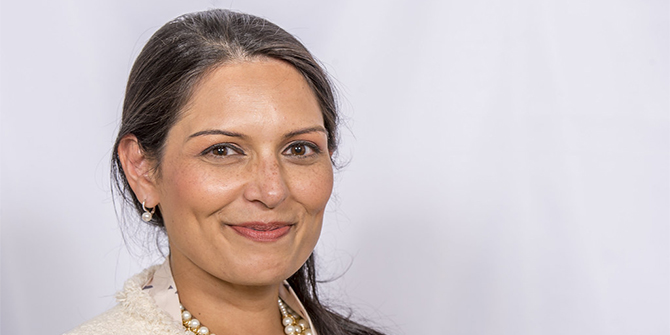
 The EU, the UK and China all want to pursue interests in Africa. In a post-Brexit world, this may lead to even greater rivalry. To prevent a neo-colonial “scramble for Africa,” the EU should now follow Fran’s Timmermans’ proposal and “embrace Africa as a sister continent”. It may be the only player that could convincingly do so. Kate Hall (Maastricht) and Mareike Müller (Handelsblatt) analyse this dimension of the recent Maastricht debate between the Spitzenkandidaten in the European elections.
The EU, the UK and China all want to pursue interests in Africa. In a post-Brexit world, this may lead to even greater rivalry. To prevent a neo-colonial “scramble for Africa,” the EU should now follow Fran’s Timmermans’ proposal and “embrace Africa as a sister continent”. It may be the only player that could convincingly do so. Kate Hall (Maastricht) and Mareike Müller (Handelsblatt) analyse this dimension of the recent Maastricht debate between the Spitzenkandidaten in the European elections.
Despite being small in size, the town of Maastricht in the Netherlands has huge significance in EU history. Having hosted the signing of the Maastricht Treaty in 1992, which expanded the EU’s field of influence from the sphere of economics into politics, it now hosted another key event of political interest: on 29 April 2019, Maastricht hosted a debate amongst the leading candidates for the role of the EU Commission President. The debate focussed on the issues and concerns of young people across Europe and allowed the candidates to defend their vision of Europe and outline what they might do if elected. Ultimately, these proposals may have consequences far beyond the EU.
Whilst much of the debate remained broad, the closing question finally offered insights beyond the usual Euroscepticism: “What is your boldest idea for the future of Europe?” The most interesting answer came from Frans Timmermans of the European Socialists Party: If elected, he wants the EU to “embrace Africa as a sister continent,” Timmermans claimed – a bold statement that may put the EU on a collision course with the UK and China.
For Timmermans, this is the key to prevent future crises while integrating Europe’s youth into the debate: the youth of today “think Europe is about crises because as long as they have been following Europe, we have been going from one crisis to the other”, he stated. He emphasised the same cannot be said of older generations, having witnessed the reconciliation of France and Germany, of Eastern and Western Europe after the fall of the Berlin Wall. Based on this idea of reconciliation, Timmermans advocates rapprochement with Africa as part of a greater reconciliation with humanity in terms of stemming the flow of refugees and asylum seekers and preventing deaths amongst those attempting to cross the Mediterranean. The refugee crisis has allowed xenophobia, nationalism and extremism to flourish in the EU. In a post-Brexit world, what is the EU’s role in shaping future European-African relations?

What are current EU-African relations?
The refugee crisis illustrated that Europe’s future is very much linked with Africa. Since 2014, over a million refugees have come to the EU seeking security and safety. Due to their geographical position, Italy, Greece, Bulgaria and Spain were the member states most affected. However, the strain the crisis has put on the EU is no secret and it will continue as long as instability rocks Africa and the EU member states continue to have no united solution to the crisis.
Of course, one cannot ignore Europe’s colonial past. At the Berlin Conference in 1885, the Continent was carved up by European powers in the “Scramble for Africa.” All of these powers are now EU members and, thankfully, their relationship with Africa via the EU can be said to be much more positive and mutually beneficial, albeit often based on economic and political dependencies. EU-African relations were formalised in the Cotonou Agreement (2002-2020), which aimed at furthering cooperation regarding development, politics and economics and trade. Then came the Joint Africa-EU partnership of 2007, which was renewed in 2017 and signified the development from a donor-based model to long-term cooperation based on mutual interests. Finally, in 2015, the European Neighbourhood Policy was revised and stipulated that the EU work with the North African region in order to foster security, stabilisation and prosperity.
Why is Africa important?
According to the International Monetary Fund, in April 2019, Africa was home to six out of the 10 countries with the highest real GDP growth (Gross Domestic Product) in the world. Additionally, in 2018, the African Union created the largest free trade area since the World Trade Agreement. By 2050, the population of Africa is expected to double to around 2.5 billion. Therefore, in a world where China and the US are constantly asserting their dominance and where emerging powers are becoming increasingly important, the EU needs to position itself to compete with these powers. With this in mind, Africa seems an attractive partner for the EU.
But is the EU as attractive a partner to Africa? The EU is not the only entity trying to deepen relations with Africa. China has been present in Africa since the turn of the millennium and, and to date, it is the continent’s largest creditor. The Belt and Road Initiative, a Chinese bid to improve cooperation and connectivity on a trans-continental scale, has seen China invest in over 3,000 infrastructure projects and pledge billions of dollars in commercial loans to a large number of African countries. And whilst EU financial support comes in the form of development cooperation assistance, Chinese investment comes with far fewer conditions attached, such as ensuring human rights are safeguarded, at least at first sight.
Africa is also very much on the UK’s radar and is predicted to be even more so after Brexit when the UK’s primary focus will be on strengthening and developing trade relations. The UK has already been laying the groundwork in strengthening its ties with Africa by committing to be the leading investor in Africa by 2022. In August 2017, the UK pledged £4 billion of investment and in January 2018, it secured the Eastern and Southern Africa Trade Continuity Agreement, which replicates the existing EU economic partnership and allows imports and the majority of exports to be tariff-free.
One prize – three competitors
So herein lies the problem: the EU, the UK and China all want to pursue interests in Africa. This situation has some resemblance to the predicament faced at the Berlin Conference of 1885. But can the three actors simultaneously pursue their ambitions, or will their competing interests result in tension and rivalry amongst themselves, ultimately blocking real progress for everyone involved?
In some ways, the UK has an advantage. Nineteen of the 54 countries in Africa are part of the Commonwealth in which countries are committed to support each other and advance shared global interests. Further to this, the EU may face difficulty in sustaining current relations with African countries where the UK has stronger links. However, if a “no deal” Brexit occurs and the UK falls into a recession, the EU might benefit as it will be difficult for the UK to uphold trade, development and investment with the continent. That said, the real question lies in whether the EU is too late to the party in terms of deepening relations with Africa. China has the advantage of being a long-established investor on the continent, and unlike the EU, China is not obliged to assess democratic and human rights standards in its dealings with African leaders.
Whatever the outcome of Brexit, it is unlikely that either the EU or the UK will neglect Africa and its growing presence in the world. Seemingly, the decision-making power is likely to be in the hands of the nations of Africa and it is up to them to take advantage of the upcoming opportunities. However, if African nations default on repaying Chinese loans, it may be more accurate to say China will be the deciding force on who, if anyone, gains access. What then can the EU offer Africa that other players in this situation cannot? If Timmermans wants reconciliation with Africa, the EU should use the European elections as a “fresh start” by not allowing the wrongdoings of the past to be repeated through a process of neo-colonisation in Africa.
This post represents the views of the author and not those of the Brexit blog, nor LSE. Image CC0 Public Domain.
Kate Hall is a student at Maastricht University studying European Studies. Her research interests include global development and international relations.
Mareike Müller is a journalist writing for the German business and financial daily “Handelsblatt”. Previously, she worked for the UN on the prevention of violence, crime and corruption. She holds a BA in European Studies from Maastricht University and a Dual MSc in International Security and International Political Economy from Sciences Po Paris and the LSE.







1 Comments